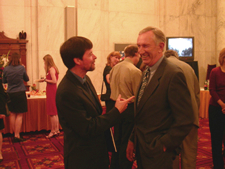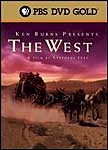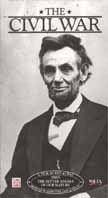 | PBS - Ken Burns is a celebrated American documentarian who has covered topics like the Civil War, baseball, Jazz, and the American West. |
|
Senator Jeffords shares a laugh with Ken Burns, producer of PBS''s The Civil War. |
|
DVD - http://www.dvdworldonline.com/DVD/TheCivilWar.asp |
|
|
http://history.acusd.edu/gen/filmnotes/civilwarburns.html |
|
Everything you wanted to know about Jazz...http://www.dvdworldonline.com/DVD/Jazz.asp
Baseball and The Civil War documentarian, Ken Burns'' latest epic is a 10-part, 19-hour history of jazz. Jazz was broadcast on PBS beginning January 8, 2001. Ken Burns spoke with Amazon.com Music editor-in-chief Keith Moerer, in an exclusive (video!) interview, about the making of the series, the legendary artists, and all the fascinating stories and interviews he''s compiled.
If you belong to the group of music fans who think Jazz is a friend of Will Smith''s, Burns'' intro to this "Jazz" will definitely stretch your mind and give your life a soundtrack with a little more magic to it. So do yourself a favor and go explore the world of Jazz.
Ken Burns has been making documentary films for more than twenty years. Since the Academy Award nominated Brooklyn Bridge in 1981, he has gone on to direct and produce some of the most acclaimed historical documentaries ever made. Stephen Ambrose, the historian, has said of Ken''s films, "More Americans get their history from Ken Burns than any other source."
Mark Twain, a two-part, four-hour portrait of one of America''s funniest and most popular writers, was co-produced with Ken''s long-time collaborator Dayton Duncan and aired on PBS in January, 2002. In January, 2001, Jazz, the third in Ken''s trilogy of epic documentaries, which began with The Civil War and continued with Baseball, was broadcast on PBS. Co-produced with Lynn Novick, this 19-hour, ten-part film explored in detail the culture, politics and dreams that gave birth to jazz music, and follows this most American of art forms from its origins in blues and ragtime through swing, bebop and fusion. Jack Newfield of the New York Post said: "Jazz is the best American documentary film I have ever seen. Period." NBCÆs Tom Brokaw wrote: "Jazz is a masterpiece of American television." John Carmen of The San Francisco Chronicle wrote: "Jazz informs, astonishes, and entertains. It invites joy, tears, toe-tapping, pride, and shame and maybe an occasional goose bump." Jazz premiered on PBS in January of 2001.
Not For Ourselves Alone: The Story of Elizabeth Cady Stanton and Susan B. Anthony, winner of the prestigious Peabody Award, was co-produced with Paul Barnes and aired on PBS in November 1999. This dual biography tells the story of the two women who almost single-handedly created and spearheaded the women''s rights movement in America, changing for the better the lives of a majority of American citizens. As Bob Herbert of The New York Times stated: "The latest splendid effort from...Ken Burns is about two women who barely register in the consciousness of late-20th century America, but whose lives were critically important to the freedoms most of us take for granted." The 2000 Peabody Award citation for the program reads: "Remarkable...It is an inspiring story of hopes, dashed dreams and dogged determination...NFOA...brings heart, soul and considerable poignancy to the stories of these two leaders of the women''s suffrage movement."
Frank Lloyd Wright, co-directed and produced with Lynn Novick, premiered at the Sundance Film Festival in January 1998, and aired on PBS in November of that year. The film, which tells the riveting story of America''s foremost architectural genius is, according to Janet Maslin of the New York Times, a "towering two-and-one-half-hour(s)...sure to have a high profile because of the turbulent, colorful life of the architect and the austere magnificence of his work, which is thoughtfully assessed." Kenneth Turan of the Los Angeles Times said the film "...has the unbeatable combination of exceptional interview material and beautiful architectural photography put at the service of an astonishing life." In 1999, it won the Peabody Award.
In November 1997, Lewis and Clark: The Journey of the Corps of Discovery was released to critical acclaim and garnered the second-highest ratings in PBS history. This four-hour film, co-produced with Dayton Duncan, chronicles the corps'' journey westward on the first official expedition into uncharted spaces in United States History. Tony Scott of Weekly Variety called the film "...a visually stunning account...Striking photography, superb editing, informative reportage and little-known anecdotes characterize the latest fine documentary work from Burns," and Don Heckman of the Los Angeles Times wrote: "...superb...a vast landscape that, even on the television screen, underscores the sense of awe reported by Lewis and Clark in their journals."
Thomas Jefferson, a three-hour portrait of our third president, aired in February 1997. This film explores the contradictions in the man who was revered as the author of the most sacred document in American history and condemned as a lifelong owner of slaves. Walter Goodman of the New York Times said: "...Thomas Jefferson is a considerable accomplishment, a thoughtful and affecting portrait of the intellectual who captured the essence of a new nation''s hopes in phrases that continue to resound around the world." And George Will, in the Washington Post, said: "...Ken Burns presents a timely corrective, a visually sumptuous and intellectually judicious appraisal of Jefferson."
In the fall of 1996, The West, an eight-part, twelve-hour film series on the American west was released. The West is the story of one of the great crossroads in human history, a place where, tragically and heroically, the best of us met the worst of us and nothing was left unchanged. Ken Burns was executive producer and creative consultant for this highly praised series, directed by Stephen Ives, which won the 1997 Erik Barnouw Prize.
Ken Burns was the director, producer, co-writer, chief cinematographer, music director and executive producer of the PBS series Baseball. Four and a half years in the making and eighteen-hours in length, this film covered the history of baseball from the 1840''s to the present. Through the extensive use of archival photographs and newsreel footage, baseball as a mirror of our larger society was brought to the screen over nine nights during its premiere in September, 1994. It became one of the most watched series in PBS history, attracting more than 45 million viewers. David Bianculli of the The New York Daily News said, "[Baseball]...resonates like a Mozart symphony." Richard Zoglin of Time wrote, "Baseball is rich in drama, irresistible as nostalgia, andģan instructive window into our national psychology." Baseball received numerous awards, including an Emmy, the CINE Golden Eagle Award, the Clarion Award, and the Television Critics Awards for Outstanding Achievement in Sports and Special Programming.
Ken Burns was the director, producer, co-writer, chief cinematographer, music director and executive producer of the landmark television series The Civil War. This film was the highest rated series in the history of PBS and attracted an audience of 40 million during its premiere in September 1990. The New York Times said that Ken Burns "takes his place as the most accomplished documentary filmmaker of his generation." Tom Shales of The Washington Post said, "This is not just good television, nor even just great television. This is heroic television." Columnist George Will said, "If better use has ever been made of television, I have not seen it and do not expect to see better until Ken Burns turns his prodigious talents to his next project." The series has been honored with more than 40 major film and television awards, including two Emmy Awards, two Grammy Awards, Producer of the Year Award from the Producer''s Guild, People''s Choice Award, Peabody Award, duPont-Columbia Award, D.W. Griffiths Award, and the $50,000 Lincoln Prize, among dozens of others.
In 1981, Ken Burns produced and directed the Academy Award-nominated Brooklyn Bridge. He has gone on to make several other award-winning films, including The Shakers: Hands to Work, Hearts to God; The Statue of Liberty, also nominated for an Oscar; Huey Long, the story of the turbulent Southern dictator, which enjoyed a rare theatrical release; The Congress: The History and Promise of Representative Government; Thomas Hart Benton, a portrait of the regionalist artist; and Empire of the Air: The Men Who Made Radio. Ken Burns has also produced and directed two films, William Segal and Vezelay, which explore the question of search and individual identity through the work and teachings of philosopher and painter William Segal.
Ken was born in Brooklyn, New York in 1953. He graduated from Hampshire College in Amherst, Massachusetts in 1975 and went on to be one of the co-founders of Florentine Films. He resides in Walpole, New Hampshire
Everything you wanted to know about Jazz
A message from Ken
The Civil War
the Park Distinguished Visitors Series
Edicational Video




